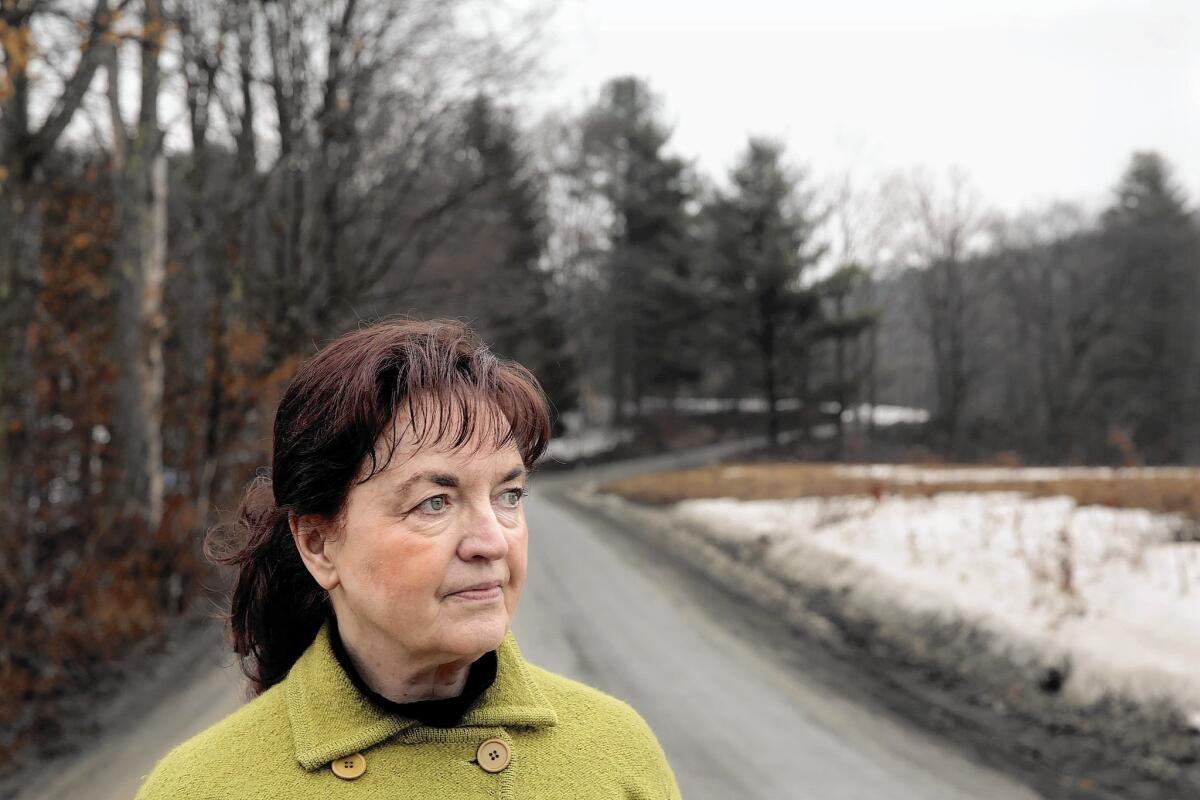In New York state, fracking ban fuels secession talk

- Share via
Reporting from WINDSOR, N.Y. — From this village of dairy farms and friendly diners, Carolyn Price can see across the border into Pennsylvania, and it is a bittersweet view. The rolling hills a few miles away are as green as the ones here, and the Susquehanna River is icy and beautiful on both sides of the state line as it meanders toward the Atlantic.
Price sees something else, though: towns brimming with money extracted from the gas-rich Marcellus Shale, where the high-pressure drilling method known as hydraulic fracturing, or fracking, has spurred an economic boom.
It is a different story here on the New York side, where Gov. Andrew Cuomo in December declared a statewide ban on fracking — one of only two in the country — saying he was not convinced it is safe.
The national debate over fracking, which critics say can pollute groundwater and endanger public health, heated up last week when the Obama administration announced the first-ever federal regulations on the practice. But nowhere is fracking as heated an issue as in the stretch of New York known as the southern tier, where Cuomo’s ban has spurred talk of secession.
Political leaders like Price, Windsor’s town supervisor, say secession is not such a farfetched idea, and they are gathering feedback from constituents to see whether there is support for a breakaway movement.
“I think it really has to be looked at seriously,” said Price, who has watched her town of 6,200 wither as locals move away in search of jobs. “We only need to drive a few miles, and we can see ourselves.” She nods toward Pennsylvania, where once-depressed towns now boast bustling businesses catering to workers from companies like Chesapeake Energy, Houston-based Cabot Oil and Gas, and EOG Resources, which used to be part of Enron.
“The natural gas is the only thing that’s truly going to save this area,” Price said.
Windsor is one of about 15 towns in New York’s southern tier where secession is being eyed, if not as an attainable goal than as a radical proposal aimed at grabbing state lawmakers’ attention and forcing them to take notice of the region’s desperation.
For years, the state has vowed to create economic opportunities in the southern tier, once home to factories that produced everything from cigars to computers. For years, though, nothing has turned around a decline that is evident in the shuttered businesses and “for sale” signs dotting the rural landscape.
Broome County, which includes Windsor, is the southern tier’s most populous county. Its biggest city and the county seat, Binghamton, had 80,000 residents in 1950. Today, it is home to 47,000 people. The fracking ban came on the same day that the state rejected the area’s bid for two casinos, exacerbating locals’ despair.
The Marcellus Shale covers about 104,000 square miles, from New York south to parts of West Virginia and Ohio, and it is believed to be the largest source of natural gas in the United States. Energy companies have been drilling into it and other U.S. shale for decades. Only in recent years have technological advances enabled them to reach previously inaccessible deposits by blasting water, sand and chemicals into the earth to create new cracks.
Energy companies say hydraulic fracturing is no more hazardous than many traditional extraction techniques when proper precautions are taken. Critics say the technique brings a host of health and environmental problems, including seepage of chemicals into groundwater and earthquakes in areas where rock is being fractured.
In drought-prone areas such as California, questions have been raised about the millions of gallons of water needed in fracking when residents face rationing. Nonetheless, only Vermont and New York have banned fracking.
Cuomo’s ban came after years of study by the state’s Department of Health, which cited “critical information gaps” in potential hazards of fracking.
“I have asked myself, ‘Would I let my family live in a community with fracking?’” Howard Zucker, the department’s acting commissioner, said as he presented the results of a 184-page report to state lawmakers on Dec. 17. “The answer is no. I therefore cannot recommend anyone else’s family to live in such a community either.”
Cuomo cited the study when he announced the fracking ban. “I’m not going to put the health at risk for jobs,” he said. “I’m not going to make that choice. I’m not going to make it in the southern tier. I’m not going to make it anywhere in the state.”
Within days, Jim Finch, the town supervisor of Conklin, about 15 miles from Windsor, had begun mentioning secession as an option. At first, the idea was seen as a joke, but the distress among locals who had counted on natural gas to revive their communities was serious.
“The southern tier is desolate,” Finch told Binghamton’s WBNG-TV last month, even as he conceded that the chances of secession were remote. Still, state Sen. Thomas Libous, a Republican who represents the region, has been asking constituents their views on secession in an online survey.
The Upstate New York Towns Assn., which represents southern tier communities and is headed by Price, plans to review results from Libous’ survey once they’re tabulated and decide what to do next. The organization was formed in July 2013 in response to what regional leaders say is the state’s tendency to make decisions that favor New York City and other so-called downstate areas.
Chief among those decisions has been the fracking ban, Price said. Local disappointment was sharpened by the knowledge that friends living a few miles away in Pennsylvania are thriving since energy companies began fracking there.
“It’s hard for them to accept that the line on the map makes such a huge difference,” said Price, adding that New York’s taxes, which are higher than Pennsylvania’s, add to residents’ ire.
The crowd at Kennedy’s Diner one recent lunch hour reflected the local frustration. As they devoured bowls of soup, heaping sandwiches and plates piled high with cheese-covered French fries, customers said they doubted anyone in the state capital would take seriously the secession threat. At the same time, they said they saw few economic options other than fracking, even if it carried some risk.
“My roots are here, but I see how people are struggling, and it’s just so depressing,” said Lisa Hayes, who hoped to lease 40 acres she owns to energy companies. Instead, she is moving to Florida in hopes of finding work as a medical assistant.
Her father-in-law, Donald Hayes, is a local tax preparer who has seen first-hand his neighbors’ financial struggles. “I tell people to get the heck out of here,” Hayes said.
He echoed others in the diner who said they believed the fracking ban was rooted more in politics than in safety concerns. Cuomo, a Democrat, has his eye on the White House and does not want to anger liberals, Hayes said.
At another table, farmers Bill and Lisa Titus said they had not seen evidence of fracking’s dangers to support the ban. It’s better to save local economies than leave them to die based on what might happen, they said.
Dan Burdick, a local businessman eating lunch with them, agreed. “Stuff happens,” Burdick said. “Be safe, but you’ve got to move forward. We need to find something to stand on our feet.”
Twitter: @TinaSusman
More to Read
Sign up for Essential California
The most important California stories and recommendations in your inbox every morning.
You may occasionally receive promotional content from the Los Angeles Times.











